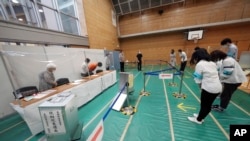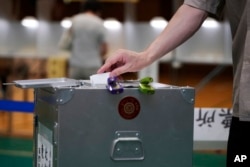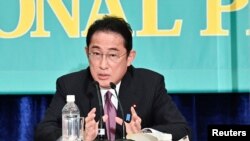Sunday’s sweeping election win by Japan’s conservative ruling coalition may help pave the way for a historic revision to the country’s pacifist constitution, but analysts warn such a revision is far from certain, noting fierce public division over the issue.
The ruling Liberal Democratic Party, or LDP, and its junior coalition partner, Komeito, expanded their majority in the upper house of Japan’s parliament, according to unofficial election results expected to be finalized Monday. Political forces that support a constitutional revision also won two-thirds of seats in the chamber — an important threshold that could make an amendment more likely.
The vote came two days after the assassination of Shinzo Abe, Japan’s longest-serving prime minister. Abe was shot and killed Friday at a campaign event in Nara, Japan. Though he resigned in 2020, Abe remained a powerful political broker who continued to push for Japan to take a tougher defense approach. He was a prominent supporter of revising Japan’s U.S.-drafted constitution, which has not been amended since coming into effect in 1947.
Prime Minister Fumio Kishida, an Abe protege, vowed after the election win to move forward with plans for a constitutional revision. Kishida said he will focus on efforts to formulate drafts that can be put to a national referendum, state broadcaster NHK reported.
Kishida also said he would seek to deepen parliamentary debates on the constitution and gain the public’s understanding, NHK added.
Any constitutional change would herald a massive symbolic shift in Japan’s post-World War II approach to the world and would spark outrage in neighboring countries that were victims of its wartime aggression. However, it is not clear a revision effort would succeed, in large part because of Japanese voters’ deep antipathy to becoming involved in any military conflicts.
A change to the constitution must be approved by two-thirds of both houses of parliament, as well as by a majority of voters in a national referendum. Opinion polls suggest the public is deeply divided on the issue, with a large number of voters remaining undecided.
“It is unlikely Kishida risks a national vote on revision until it was a near certainty,” said Jeffrey J. Hall, a Japanese politics specialist at the Kanda University of International Studies.
A longtime goal
Changing the constitution — in particular, Article 9, which renounces war and bans the maintenance of a standing military — has long been a goal of Japan’s conservative rulers. Any unsuccessful revision would amount to a major setback.
“The LDP has been playing a long game. Since the moment they formed their party in the 1950s, their most conservative members, including Abe’s grandfather, wanted to get rid of Article 9. They are waiting for the day to come when they are sure they can actually do it,” he added.
According to a poll published last week by the Asahi Shimbun newspaper, 36% of voters supported a revision, while 38% of respondents opposed such amendments. Most polls suggest the issue is not a major priority for voters.
But if a constitutional revision was formally proposed, it would result in a national debate that would dominate news coverage, Hall said. “There’s no telling where the large percentage of undecided voters would shift,” he added.
Since Russia’s invasion of Ukraine, Japanese public sentiment seems to have shifted in favor of a more robust defense policy. Under Kishida, Japan has been on the frontlines of a Western-led effort to pressure Russia. Last month, Kishida became the first Japanese leader to attend a summit of NATO, the Western military alliance.
Sunday’s election result, as well as recent opinion polls, suggests broad public support for Kishida’s more assertive foreign policy.
With most of the votes counted, the LDP appears on track for its best result in nearly a decade, with the country’s already divided opposition suffering major losses. The election win could provide more political wiggle room for Kishida, who will likely not face another election challenge for three years.
Kishida's next moves
Kishida will now face pressure to at least go through the motions of moving forward on constitutional revision, said Corey Wallace, who focuses on security issues at Yokohama’s Kanagawa University.
“But I am not sure if Kishida will believe that it is the best use of his political capital. He has his own economic agenda, and he will, over the next six months, be making some decisions on what to do with Japan’s defense, including how much to dedicate to defense spending,” Wallace said.
The LDP aims to roughly double defense spending to 2% or more of gross domestic product over the next five years, amid threats such as China, North Korea and Russia.
However, with the cost of living skyrocketing, even some conservative politicians oppose an increase that sharp.
The debate has also been shaken up by the assassination of Abe, who was the highest-profile voice calling for a more conventional defense posture. It is not clear who, if anyone, can fill Abe’s shoes, according to analysts.
“Without Shinzo, we don’t have a visible figure to promote this agenda,” said Lully Miura, a political scientist at the Yamaneko Research Institute in Tokyo. “There are not so many guys like Prime Minister Abe.”






